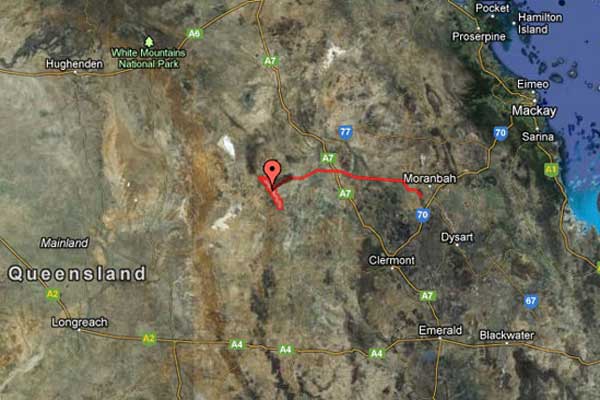Indian mining giant Adani has given a tacit nod to news broken by Guardian Australia yesterday that the company has ordered a halt to engineering work connected to its massive Carmichael mine in the Galilee Basin.
The mine is the largest of a cohort of nine proposed for the basin, 300 kilometres inland of the Queensland coast, and is seen as key to the development of infrastructure needed to transport and ship coal from a number of Galilee mines.
If they go ahead as proposed, the mines would produce more carbon emissions than the United Kingdom or South Africa once the coal, which would be shipped through the Great Barrier Reef, is burnt by third-party countries.
In response to Guardian Australia’s report a spokesperson for Adani issued a statement late yesterday, explaining that “it is important to note [Adani] are now into the fifth year of development and approvals and therefore the need to finalise those approvals and timelines is critical”.
The company has struggled to attract finance for its projects amid multiple court challenges and growing community opposition, with 11 international banks so far ruling out support for the Galilee coal fields.
The Guardian reports that four major engineering firms – WorleyParsons and Aecon, Aurecon and SMEC – which were working on key infrastructure including the joint venture rail line and Abbot Point Port have been put on hold.
The company had become the focus of a national debate about the future of the Great Barrier Reef after its plans to dump dredge spoil from Abbott Point – which Adani proposes to expand to be the largest coal terminal in the world – were heavily criticised by conservationists.
The government has since quashed Adani’s proposal to dump the dredge on the reef, a measure the Indian firm has now accepted. But the results of a Queensland court case heard earlier this year are yet to be handed down.
The Land Court heard from Adani’s own expert witnesses that the benefits the Carmichael mine, rail, and Abbot Point Port projects would create would be substantially less than the company had claimed.

The state government, which is yet to issue full approvals for the mining project, will have to wait until the court makes a recommendation on the project until it can issue any approval.
That’s not expected to happen until later this year, by which time a separate case could stall the project’s ultimate approval.
The Federal Court will sit in August to hear complaints that the Commonwealth Environment Minister did not adequately take into account the impacts Adani’s mine would have on the environment because he did not consider the impact of the carbon emissions it will create when the coal is burnt in third-party countries.
“For the past six to 12 months, Adani has maintained a level of investment, jobs and sub-contractor engagement for its mine, rail and port projects in anticipation of finalising approvals and decisions,” a spokesperson for the company said.
“As a result of changes to a range of approvals over that time, it’s necessary to synchronise our budget, project timelines and spending to meet those changes.”
Despite the growing litany of challenges, Adani said it stands by “a commitment to building a long-term future with Queensland”.
If Adani waits, that long term future could involve a subsidy from the Abbott government, which has announced that its $5 billion Northern Australia Investment Facility could extend to Galilee Basin coal mines, and particularly projects that would otherwise be unable to turn a profit.
However as the global movement to tackle climate change ramps up and the price of coal continues to go down, Guardian Australia’s suggestion that Adani’s decision to tell contractors to halt engineering work could be ‘running up the white flag’ looks increasingly likely.
One industry source told Guardian Australia that “the cost of contracts for engineering design and proposals, at several million dollars a year, was negligible in the context of a multibillion-dollar project and Adani would need the work done in any case”.
“It makes no sense,” the source said, for Adani to suspend work done by engineering teams employed on short-term contracts that would have already moved on should the company decide to resume work later.
“In my experience, the most common reason for delays in project completion is because engineering hasn’t been finished on time,” he said.
“When you get the chance where you then continue with the engineering but the project has been pushed out, usually that’s a blessing in disguise.”
Donate To New Matilda
New Matilda is a small, independent media outlet. We survive through reader contributions, and never losing a lawsuit. If you got something from this article, giving something back helps us to continue speaking truth to power. Every little bit counts.



